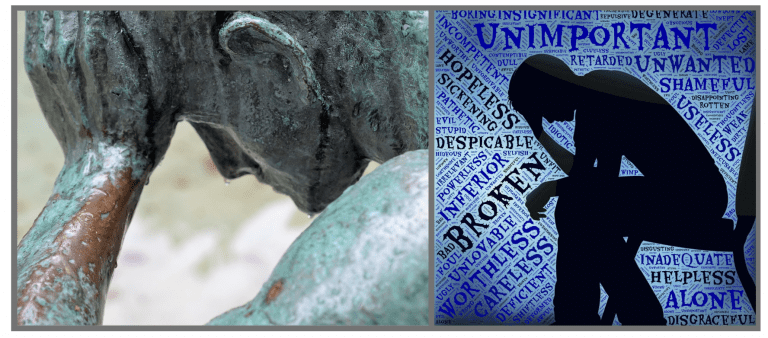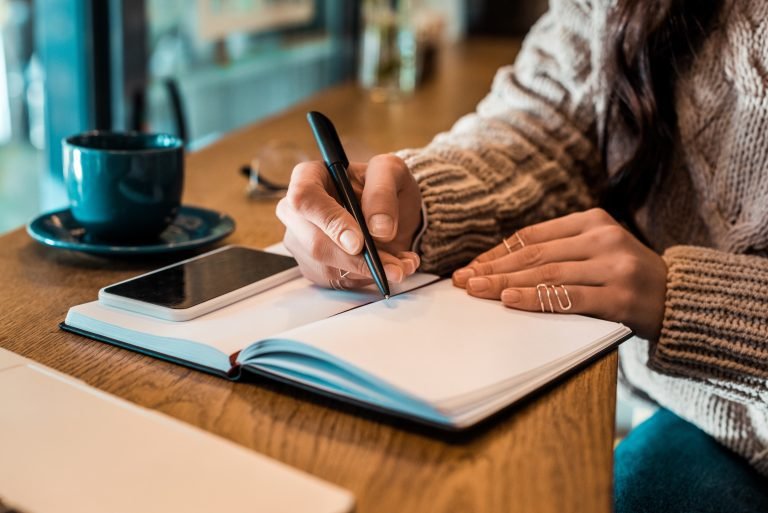Welcome to our post on Overcoming Fear. Everyone has fear at some point in their lives. Fear from physical harm, fear from failure, fear from bankruptcy, fear from social embarrassment, fear from infection. It is a survival tool that has helped us stay alive through the never-ending trials of human existence. It is something that protects us from harm during our interactions with other humans and has allowed us to position ourselves as the dominant species on the planet..

But what happens when our fears continue to penetrate and influence our thoughts even once the danger has passed? The grip that fear can have over us can be crippling and push us into inactivity, negatively influencing our lives and potential (the current world events we find ourselves in revolving around the Coronavirus being a prime example!). This article covers positive strategies for overcoming fear and anxiety and pushing us forward when we would rather play it safe and hide away from the big bad world.
fear/fɪə/
Noun
an unpleasant emotion caused by the threat of danger, pain, or harm.
Verb
To be afraid of (someone or something) as likely to be dangerous, painful, or harmful.
Introduction - About fear
All animals need fear to help them respond to predators and other threats to their existence. The senses detect an external threat to their wellbeing, it is processed by the brain and a response is then given to deal with the threat. This response can be hormonal or electrical and is designed to heighten the senses and provide ‘action’ hormones such as cortisol, adrenaline, and noradrenaline to physically counter the threat in one form or other (aka the ‘Fight or flight’ response). This is a normal healthy response, it keeps us alive until the threat has been averted or overcome. After that hormonal and electrical responses return to normal, the heightened state subsides (we relax).

However problems occur when fear is continuous, when we live in a state of fear. The constant stress means that the glands involved in hormonal response are always switched on and begin to overload our bodies with stress hormones. The impending sense of dread means that our nervous systems continually detect the threat and do not know when to shut down the ‘fight or flight’ response. Over time semi-permanent state of heightened tension can have disastrous effects on our mental and physical wellbeing.
Fear and self loathing in modern society
Threats to our safety are not as obvious in the modern world as they were say in the dark ages. In those times death could come from a variety of ways including raiders, plague, famine or wild animal attacks. Granted in most modern societies these problems are slowly being eradicated. However there are threats are still plenty of threats out there. Muggings are commonplace in less privileged areas, poverty and debt are widespread, feral animal attacks still occur. To make matters worse we also have to deal with seemingly endless wars and conflict, natural and man-made disasters, the potential of asteroid collision with the planet, the possibility of mass extinction and indeed global pandemics!! We are bombarded with this news 24/7 in the papers, on tv, radio and on the internet.
However, this type of devastating news is not what we expect as soon as we set foot outside our doors. The ever sensationalist main stream media certainly do not help with allaying public fears. Indeed if you believed everything blurted out in the media and took it at face value you might actually think you’d drop dead as soon as you stepped outside. Since bad news sells whatever terrible media message being spun is usually on loop (in case we forget). So every time you engage in tv watching or read the papers there it is! Fear sells and worse still we tend to buy into the never-ending drama.

If we put aside the bigger sources of fear in modern society for a moment and look at smaller though arguably more subtle sources. These smaller fears and anxieties are perhaps just as corrosive in terms of their impact upon our wellbeing (for example fear of exclusion, social embarrassment, not fitting in, looking stupid whilst exercising). The rise of social media has seen the creation of many accounts of ‘perfect’ people living seemingly ‘perfect’ lives. Although on the one hand instagram accounts can be inspiring and even instructive (great ideas can definitely be found on there) they can also leave many people feeling inadequate and missing out in their lives. Indeed there is the popular abbreviation FOMO (Fear of Missing Out) often used and hash tagged in messages.
According to Ahmad Hariri (psychology and neuroscience professor at Duke University) “Change has occurred so rapidly for our species that now we are equipped with brains that are super sensitive to threat but also super capable of planning, thinking, forecasting and looking ahead, we essentially drive ourselves nuts worrying about things because we have too much time and don’t have many real threats on our survival, so fear gets expressed in these really strange, maladaptive ways.” Furthermore, talent tv and reality tv shows provide us with a message ‘you are either a winner or a loser’, there doesn’t appear to be any in-between. Since modern society also loves to run people down (tabloid hack articles, social media trolls and bullying) it can be nasty place to find yourself if you are not well received.
Overloaded with all of this, It is no surprise that social anxieties are much more commonplace in todays society. Issues such as social anxiety, hypochondria, post-traumatic stress disorder, insomnia, phobias are much more commonplace that at any point in history.

This constant overload of often negative feedback and information can stop us the average person from even considering bettering themselves. Fear becomes the enemy.
The long term impact of chronic fear
According to findings into the Effects of Chronic Fear on a Person’s Health (2017), physical and psychological effects included symptoms such as:
- Immune system dysfunction.
- Endocrine system dysfunction.
- Autonomic nervous system alterations.
- Sleep/wake cycle disruption.
- Eating disorders.
- Alterations in hypothalamus-pituitary-adrenal axis.
- Dissociation from self.
- Unable to have loving feelings.
- Learned helplessness.
- Phobic anxiety.
- Mood swings.
- Obsessive-compulsive thoughts.
- Cardiovascular damage,
- Gastrointestinal problems such as ulcers and irritable bowel syndrome
- Decreased fertility.
- Accelerated ageing and even premature death.
- Memory impairment.
- Negative life choices.
- Long-term mental health issues such as fatigue, clinical depression, and PSTD.
Coping Mechanisms
It is clear that living in a state of permanent stress or fear is not a healthy picture. Indeed nobody should have to live like this. Therefore to counter this type of negativity from stressful news or events it is important to have effective coping mechanisms in place. A coping mechanism is a strategy used during times of trouble or great stress to help manage the resultant painful or difficult emotions. These mechanisms can help people confront and adjust to stressful events while helping them maintain their emotional well-being.
Regardless of where the fear in your life stems from (be it a long term phobia from childhood, recent news such as Coronavirus or anxieties over debt, work or fitness) developing good coping mechanisms and strategies will help deal with the issues and to help you move forward.
Coping mechanisms for confronting and overcoming fear
Preparation:
- See the benefits of facing your fear. You can’t run forever, sooner or later that fear will catch up with you, better to confront it now than be put in an unavoidable and traumatic situation later. Confront your fear, put yourself out there and over time this will boost your confidence and control over it. Don’t hide away and lie to yourself, be pro-active now and get in control of your life!
- Acknowledge your fears. Write your fears in your journal. Where and when you think they started. How it has affected you. How severe is the fear from 1-10? Is it a mild anxiety (1) or crippling fear (10)? This is a brainstorming sessions to help you understand the source of your resistance. For example, are you afraid of public speaking? Perhaps it is actually the fear of rejection or looking like an idiot that scares you? Is it a phobia of strangers, dogs or going outdoors? An anxiety of looking foolish undertaking exercise in front of others? Whatever it is it’s important to identify the underlying issues, so you can actually target them and resolve the issue.
- Breaking down the steps in confronting your fear. Break confronting your fear down into smaller chunks. Undertake them one step at a time. The important thing is to progress, slowly but surely. Inactivity is only going to make it worse, actual experience will build confidence and courage. If you are scared of heights start by climbing a small ladder, progress to going up and surveying the view from taller buildings, take your time, question your irrationality and remember to breathe! Anxious of looking stupid running because you haven’t exercised in years? Plot a route locally in a less populated area until your fitness progresses or join a running club for beginners. Start small and build on your successes, just remember to always push yourself that bit further each time.
- Develop a support system. When you can voice your fears out loud to someone you trust, you release the pressure. Have a supportive network of friends and family around you can fall back on for advice when things the going gets tough. Don’t live near them? There is Skype, FaceTime, Zoom and a whole range of face-to-face communication apps that will enable you to keep contact with people close to you.
Active tasks:
- Do your Homework read up on the subject from valid and respected sources (avoid mainstream media sources who will often sensationalise findings and may even have a bias to fit their narrative). Fear can have people jumping at shadows and speculation. Question what you are reading or listening to and if you are not getting a plausible explanation then continue to dig around.
- Be prepared. Have a strategy in place in confronting your fears. If its a great task you are undertaking, know your task/material so well that you don’t have to think about it. Ensure all the logistics are covered in advance so you don’t have to worry about anything and can focus on the task at hand. Have checklists written up to ensure you have covered all your bases. Do rehearsals in your head in front of the mirror, with friends, and at the actual location of your event. Cover your weak spots, have friends ask difficult questions or give feedback of your performance. They will be able to see what is in your blind spot. Think out worst case scenarios and have contingency plans in place to counter them should they arise.
- Journal and record your progress. Reflect on all your progress throughout the confrontation of your fears, all the obstacles, the successes and failures. Write it all down.

- Relaxation techniques. You have to learn to reign that Amygdala in when it begins to run amok! There is no better way to take control during stressful situations than going back to the most basic function in life, your breathing. So take time to focus on your breathing during stressful events. Learn how to meditate, be mindful, make sure you go for runs or long walks, use yoga. Undertake activities that require a complete disconnect. No phone, no wifi, no tv, just you alone with your thoughts. Focus on the basics, your breathing, your environment, the people and even the animals around you (yes even pigeons).
- Find your heroes and study their mindsets. Study the lives of the people who inspire you, be it a sporting hero, political or historical figure, basically anyone that has had to overcome great adversity. Be inspired by their struggles and adversity, as well as the courage and bold choices they used to overcome the obstacles that they may have faced.
- Exercise. No better way to get rid of all that pent up energy than exercise…or maybe sex…which is a form of exercise in my book :D. Distract yourself in a positive way! Get your blood circulating, muscles working and pump that oxygen to your brain. This will also also help the body push out all the excess negative hormones via the kidneys, which brings me onto…
- Water, drink lots! Above and beyond the best drink for your by a long shot. Flush out the toxins and overabundant hormones in your system. Hydrate your brain and internal organs. This will help you think clearer and make your body work much more efficiently.
- Bulletproof your nutrition. Look at making better lifestyle choices. People use the ‘healthy food costs too much’ excuse all the time, don’t buy into it. The average grocery store is throwing vegetables out the door. Compare the price of the average burger to the amount of vegetables of fruit you could buy that could last you for days! Can’t cook? Me neither! You have the internet and the amount of quick and easy healthy meals you can find that can be put together in 15 minutes or less is crazy. You have the resources so go use them get creative. Produced food and junk food are just going to make you feel dreadful and bring down your immune system. If you really have to just limit them to a few days or one cheat day a week. Drop weight + Save money + boost immune system and overall health = greater confidence to overcome adversity.

- Get out of your comfort zone! Force yourself into difficult situations, this will steel your will and make you more mentally resilient. More often than not you will find the situation you have been trying to avoid is nowhere near as bad as you have imagined it to be. Like a stand up comedian go face that hostile crowd, once they have booed you off once they’ll never have the same impact again. Scared of exercising in the park? Go do it once. Then challenge yourself to do it again. Fortune favours the bold.
- Seek out professional advice or help. If its a chronic fear you are facing, look for advice or support groups, online or local meet-up groups. You can literally find a support group for any concern these days with a bit of research. So meet-up, share your thoughts and find ways past your problems. If the fear is a physical or mental challenge that intimidates you try finding a coach or mentor. Be willing to pay any price and go to any lengths to get past whatever is holding you back. Often having a mentor to guide you is what’s needed to get you past any resistance. They will be able to squeeze the most out of you, correct any issues with technique, provide encouragement and help you avoid injury.
- Reward your successes. Whenever you finish a task however small that should be, acknowledge it with a small reward of some kind (food, drink, a holiday or even a present for yourself). You overcame your fears and you did it so that should be rewarded. Use classical conditioning on yourself and associate overcoming fears with rewards.
- Engage with people. Talk about your fears with others, you might be surprised to find that they have similar fears and anxieties. Even if they don’t people are (generally) sympathetic and supportive and will often offer advice or be able to tell you how a friend dealt with a similar issue. Open up.
- The future/Room for improvement? Make notes on your performance and consider how you can improve on it for next time. If you have recorded yourself, study the footage and constructively criticise yourself. If someone has been observing you ask for feedback on your performance. This will improve your confidence and reduce your fears.
- Develop hobbies and routines. Make your bed, tidy your shit, develop a routine and stick to it. No submitting to apathy or pathetic behaviour. This will give you direction and focus. Always wanted to learn a new skill? What is stopping you? Never before in human history has there been the access to all manner of information that there is today, much of it for free. Read that book, learn that language or skill you have always wanted to! Your opportunities are only limited by your state of mind.
Mindset:
- Realise that fear is your ally. Make Your Nervous Energy Work For You. Learn to channel any nervous energy into positive energy. If your body is full of adrenaline, don’t waste it!! Use it in a positive way to keep you sharp and focussed (see exercise and developing hobbies above).

- Change your attitude. It’s all in how you look at it. Regardless of any decisions you make or outcomes, there will be a win in there somewhere. You may or may not lift a gold trophy at the end of your journey or indeed not make it to the top of the mountain. Doesn’t matter, the goal itself is nothing, the journey is everything. You are pushing yourself, learning about your capabilities and your strengths and weakness. Even baby steps are a step forward and that is the way you are going, not backwards or standing still.
- Learn to be comfortable with who you are. Accept yourself warts and all. Many people dread seeing themselves in the mirror or on video recording. You have to get past that. Record yourself and get comfortable listening to your own voice. Study your non-verbal communication (facial expressions, gestures, body movements) and learn how to use it to your advantage. Regardless of your task or endeavour getting used to visualising yourself in action is going to improve your performance and confidence. This in turn will be a big factor in reducing your level of fear.
- Focus. When you organise all of your thoughts and materials it helps you to become much more relaxed and calm. When you have clear, organised thoughts it can greatly reduce your anxiety because you can better focus on the one thing at hand. Focus on the task at hand, and giving your best performance rather than on whoever may be watching you.
- Visualisation. Another important tool to help get you in the right frame of mind and shake off your doubts is to mentally rehearse undertaking your task/event on the day. Imagine you are at the event/venue with people watching you. If you can visit the venue beforehand, walk around, get a feel for the room and the environment. This will enable you to feel more comfortable when it is go-time.
- Use mantras to ensure that you have the right mindset. Mantras are a powerful mental conditioning tool that can be used very quickly to reset your mind and shake off nagging doubts or fears. Use any positively charged phrase or expression and use it whenever the need arises. For example ’No fear!’ ‘This is mine!’ Or ‘God is great!’ Whenever you find fear kicking in, say your mantra over and over to yourself to enable context dependent memory. If and when the time arises you repeat the powerful phrase and it will help relate to the hundreds of times you have successfully rehearsed in your mind.
- Plan and prepare for your worst case scenario.If you are prepared for the worst, then what can possibly go wrong? Have contingency plans for contingency plans for contingency plans in place. If something goes wrong on the day, immediately switch to your back up plan.

- Practice, practice, practice! Repeat the task you are undertaking a thousand times until it is ingrained in your memory. On the day it will be as automatic as putting your clothes on.
- Develop self-belief. Focus your attention on being prepared and the task at hand. Keep trying again and again and again. In time your self doubt will decrease and your confidence and self belief will increase. If you work hard and push aside negative thoughts you will get there in time. Putting your head in the sand like an ostrich will not make your fears go away.
- Determination. Ignore your feelings of embarrassment, looking stupid, rejection and facing failure. This is slow progress. Get through and beyond this!
- Don’t be afraid to laugh at your fears. Humour is important. Learning to laugh at yourself is even more important. Lose the ego, that is like an anchor around your neck. Many great people in history had embarrassing stories in their lives why should you be any different? Laughing at yourself and your fears will give you greater control over the situation.
- Don’t beat yourself up. Stop terrorising yourself. You are already a hero for confronting things that scare the crap out of you. So give yourself some slack, even if you fail. Resolve to do better and every time you fall dust yourself off and try again.
- Study philosophy. Even if you are not into it, there is much you can take from the quotes of great people with practical advice for how to confront struggle in life. Check the internet for quotes from the Stoics, the Pragmatists and the Existentialists that will help you see fear for the waste of time that it is. For stoicism look up quotes from Marcus Aurelius, Epictetus. For Pragmatism check out John Dewey or William James. For Existentialist thought try Jean Paul Sartre.

- Accept your death. Yes you read that right. The big dirt nap, the great unknown. Often in our lives we bury ourselves in our everyday tasks and forget about the bigger picture. Your life is finite, death is inevitable. It is going to happen so why worry about it? If you can get past this then you will realise there is truly nothing to fear in life! In fact, this realisation may give you the boost that you need! The clock is ticking, what are you going to do with your short time on earth? Sit around worrying about things or making the most of what you have got?
Negative coping mechanisms to be aware of:
- Overthinking things. Everyone is a critic. Although positive feedback is incredibly beneficial, if someone praises you and then offers advice, make sure you are listening! However, there is always going to be someone around with that negative feedback. Don’t waste your breath on any energy vampires and their insecurities. Smile, state you are sorry they didn’t enjoy it or agree and move on.
- Avoidance.The opposite of the above, aka the bury your head in the sand approach. Using distractions such as Netflix binge watching and video games to blank out having to think about your fears.Blotting the problem out in the hope they will just disappear in time.Chances are your problems won’t, with time problems have a snowball effect, gradually becoming larger and larger.Tackle your problems now, come up with a strategy to tackle them, seek advice where you can.

- Comparing yourself to others. You are only ever competing against yesterdays version of yourself. Avoid comparisons, which lead to feelings of inadequacy. Your life experiences are unique to you. You will always have someone out there better, faster or more eloquent than you. So why worry? The earth is still spinning, you are still progressing, you are still breathing, so quit stalling and get after it!
- Mainstream news and social media. Detach from the world and stop paying attention to all forms of negative media. Whilst the endless headlines of ‘war/famine/death/disease’ are rolling out instead engage with the real world? Can you hear any guns firing or people screaming? Thought not. Try and notice how many clouds there are in the sky or the smell in the air (unless like me you live in London!). Ditch the headphones and start paying attention to what is going on around you or your form during exercise. Try putting aside social media for one week. Do you really need it? Is it an accurate depiction of who you are and everything you want to be as a human being? No, social media is just crack for the digital age. If you can’t be without it then try and decrease the amount of time you are on it. Leave the phone at home one day a week. In time FOMO will turn into GIMO (Glad I Missed Out).
- Drinking or drugs. This isn’t going to help you. It may dull the fear initially but chances are it’s going to make you dulled and maybe even incoherent. Over time you will probably become reliant on this and use it as a crutch to help you overcome your fears. And there may be that one time that your drug/booze isn’t available. What then? This route is a negative downwards spiral. Overcome fear the right way, confront it, learn from it, advance confidently and positively.

- Comfort eating. Comfort eating is all too easy during times of high stress, and as we all know this is just a vicious circle. You overeat you gain excess weight and now you have the additional stress from being overweight and/or unfit, so you do some more comfort eating and on and on. Don’t do it or at least if you are going to at least make sure your have healthier choices available. If you have a task coming up you are dreading such as a presentation or physical challenge, avoid spicy or sugary food. Avoid caffeine too! Stress and fear can leave you running for the toilet as is, the last thing you want is for something you have eaten or drunk to trigger you just before show time. For any challenge I have faced I generally do better with a light snack beforehand or with an empty stomach. The adrenaline will provide you with enough energy to carry your through (unless confronting your fear involves the challenge of a long distance run or other physical event in which case by all means eat as required!!)
- Overspending. In an era of credit cards, loans and debt it is all too easy to ignore your problems and indulge in some retail therapy as a way of avoiding fears. You know this will leave you in a worse position than you already in but then you get the fatalistic voice whispering in your head “f$%k it! You only live once!” You push to one side the knowledge of spiralling debt and future misery for a brief moment of satisfaction. If you can’t afford it, don’t do it, be smart, be responsible and look to better coping mechanisms. There are so many things in this world that are free and that will reduce your anxieties better than another purchase ever will.
Summary
Fear is a primal, survival response that has over human history kept us alive and allowed us to thrive as a species. Conversely, chronic fear can be highly unpleasant state that begins to slowly encroach and have a negative impact on all areas of an individuals daily life. Hopefully some of the coping mechanisms we have covered will assist with developing positive advice and strategies to help overcome the crippling resistance fear can induce. Now more than ever it is important to stand tall and not to give in to destructive thoughts and feelings. Be safe but also be proactive, help those around you, get rid of destructive behaviours and embrace the now.

'Most people are paralyzed by fear. Overcome it and you take charge of your life and your world'.
- Mark Victor Hansen
If you have enjoyed this post please share or feel free to comment below 🙂
Related Posts
Our Other Posts









